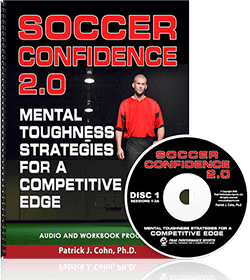
Moving on After Bad Calls
Do find it difficult to focus on your game after a soccer referee makes a bad call against your team?
Do your emotions interfere with your play after a phantom foul is called against you?
For example, you are playing against a rival soccer team with the score tied in the middle of the second half…
You and an opposing playing are going for a ball that you clearly get to first… The opposing player flops and the referee awards the opposing team a free kick.
You become outraged and heated over the bad call and argue with the referee only to get a yellow card.
The rest of the game you play tentatively to prevent your ejection from the game and rendered yourself relatively ineffective for your team.
Research indicates crowd influence, or noise, can possibly contribute to the phenomena known as ‘home-field advantage‘ in sports, by influencing referees’ decision making.
In the opening game of the 2014 World Cup, host country Brazil faced off against Croatia. Brazil had home-field advantage playing in Sao Paulo in front of more than 62,000 fans.
Croatia took the early lead scoring a goal nine minutes into the game but Brazil but managed to score before the end of the first half to tie the game 1-1.
During the second half, the referee awarded Brazil a penalty kick for a phantom foul in the box despite only incidental contact between the players. The penalty kick resulted in a goal giving Brazil a 2-1 lead.
The referee proceeded to make another debatable call disallowing a Croatian goal that would have tied the game. Brazil ended up scoring a third goal and won 3-1 in controversial fashion to lift the hosts into the top slot in Group A.
Croatian coach Niko Kovac was appalled by the officiating in their game against Brazil.
KOVAC: ”That is shameful… this is not a World Cup referee. He had one kind of criteria for them and another for us. The rules were not the same.”
So what’s the resolution to bad calls or bias for home teams?
There are some negative responses such as arguing or intentionally fouling opponents which could result in your dismissal from the game.
You could allow your frustration or anger to get the best of you and interfere with your performance on the field.
Or you can come to some positive resolution… It’s okay to get mad at the call (that’s normal)…
But you need to keep your emotions in check, focusing on your next touch and look for opportunities to make plays on the field.
It may not be easy in the heat of battle but the alternative (negative responses) only serve to give the opposing team an advantage.
Try these tips to respond positively to bad calls:
Tip #1: Prepare mentally for the fact that bad calls will be made during games. There is a subjective element to officiating… How will you effectively respond when this happens so it does not hurt your game?
Tip #2: Prior to games, choose how you want to respond to these types of situations. Play out a scenario in your head. See yourself responding with composure, refocusing on the next play, and using it to positively fuel your play on the field.
Improve your mental game in soccer today with our Soccer Confidence Workbook Program!
Related Sports Psychology Articles
- Is The Mental Game the Weakest Link in Soccer?
- Playing Hard for a 90 Minutes Game
- How To Compete With Ultimate Confidence
- Subscribe to The Sports Psychology Podcast on iTunes
- Subscribe to The Sports Psychology Podcast on Spotify
Download a free sports psychology report to improve your mental game!
Learn more about our one-on-one mental game coaching.
Boost Confidence in Soccer

“Soccer Confidence 2.0” 3-CD and Workbook program is the most comprehensive mental game program we’ve offered to the public. We’re virtually giving away all our mental game secrets for the incredibly low price of only $197.00 including the free bonuses!
“Soccer Confidence” is a complete brain dump of the TOP NINE mental training sessions we teach our soccer players to help them boost their mental game and improve consistency – from how to mentally prepare for games to performing under pressure to building unstoppable confidence.
